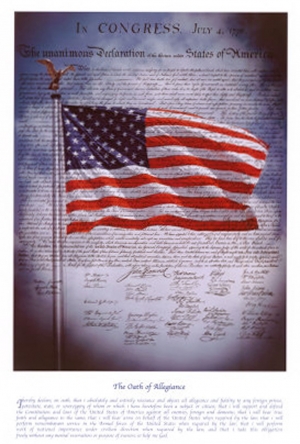|
We Hold These Truths to be Self-evident
By Tom Pedersen — Wednesday, July 1st, 2009
 As we prepare to celebrate the 233rd anniversary of the birth of our nation each American should revisit that magnificent document, the Declaration of Independence, that our Founding Fathers created to announce to King George III, to the people of the this great land, and to the entire world that the United States of America was a free and independent country. The Preamble to the Declaration of Independence clearly pronounced: "We hold these truths to be self-evident: that all men are created equal, that they are endowed, by their Creator, with certain unalienable rights, that among these are Life, Liberty, and the Pursuit of Happiness. That to secure these rights, Governments are instituted among Men, deriving their just powers from the consent of the governed, That whenever any Form of Government becomes destructive of these ends, it is the Right of the People to alter or abolish it, and to institute new Government, laying its foundation on such principles, and organizing its powers in such form, as to them shall seem most likely to effect their Safety and Happiness." The concept of "unalienable rights" is a philosophy that is uniquely American and is proof that the creators of the Declaration of Independence believed in God and believed in the rights bestowed on men by God. The Founding Fathers felt that those rights were so important that no government should deny them. At the time of their birth all men are equal, not in ability or condition, but with the equal endowment of "inalienable rights". Inalienable rights are rights that are not contingent upon the laws, customs, or beliefs of a particular government or social system. Legal or civil rights, on the other hand, are rights created and enacted into law by a government or societal entity. Such rights are based upon local laws, customs, or beliefs. Inalienable rights are therefore applicable to all men and women, whereas legal and civil rights, since they are developed by groups, are applicable only to the individuals in specific cultural and political groups. Abraham Lincoln, speaking of the Declaration of Independence, said, "It was not the mere matter of the separation of the Colonies from the motherland; but that sentiment in the Declaration of Independence which gave liberty, not alone to this country, but, I hope, to the world, for all future time. It was that which gave promise that in due time the weight would be lifted from the shoulders of all men." That weight is still heavy on mankind throughout the world today. In this age of dictatorships and totalitarian governments that threaten the annihilation of human dignity and basic freedoms, we need more than ever to turn to our oldest and noblest charter for hope and direction. Outside of the sacred religious writings of man, this document more than any other has inspired Americans to the cause of liberty and freedom.. The Declaration of Independence still proclaims the undying faith in mankind that has guided and defined the people of the United States of America.. |
